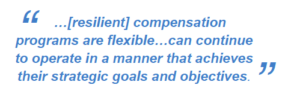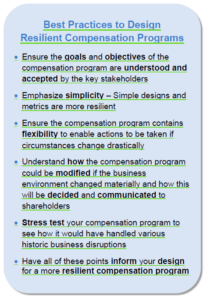 Ed Hauder
Ed Hauder
Are your executive compensation programs structured to remain relevant in unexpected circumstances? Will your pay programs continue to motivate, attract and retain key executive talent when there are significant changes in the business, macroeconomic, regulatory or geopolitical environment?
While no program can anticipate every scenario, a resilient compensation structure can allow a company to weather the unexpected without chasing one design change after another.
Part of managing compensation programs is to ask “what if” questions and review how compensation programs fare under different events. In a word, you need to stress test your compensation programs. If compensation programs are not appropriately flexible or adaptable to changing circumstances, this could lead to suboptimal outcomes for the business, including loss of key talent, a demotivated workforce or compensation outcomes that are not aligned with the company’s strategic goals and objectives.
Compensation resilience should be considered from two perspectives: (1) structural, the design of compensation programs and (2) philosophical, how the company thinks about compensation in the context of unanticipated events that could or did disrupt the company’s business.
Why Worry About Compensation Resilience?
Questions about the resilience of compensation programs tend to surface during periods of adversity. When times are good, the need for compensation program resilience is less. However, that is precisely when companies should be laying down a solid foundation to ensure that their compensation programs are flexible. That way, when troubles arise, they can be met head-on with a compensation program that can roll with the punches and continue to serve the purposes for which it was designed.

The view of outsiders, shareholders and proxy advisors can be more critical of actions taken during troubled times to ensure compensation programs will continue to operate in a manner that achieves their strategic goals and objectives. Many companies found this out when COVID-19 hit their businesses and they were forced to refine or redesign their compensation programs to react to the developing situation on-the-fly and without the cushion of strong results to moderate shareholder criticism.

What Types of Items Can Challenge Your Compensation Programs?
Typically, the events or circumstances that stress compensation programs are significant short- and long-term changes in the business environment that were not anticipated when the program was implemented. COVID-19 is a recent example, but there have been others such as the collapse of the oil market, the sanctions against Russia and the war in Ukraine – all of which had broad impacts on businesses.
It is these extraordinary events that are impossible to plan for (disease, war, civil strife, etc.) and which your compensation programs must be able to weather successfully to achieve strategic goals and objectives.
What Can You Do to Test Your Compensation Programs’ Resilience?
Companies can assess the effectiveness of their compensation design in good times by back-testing “what ifs” using historical disruptions to see what would have been right for the company. This information provides insights into holistic principles that help the compensation program weather the storm in a way that supports the company’s strategic goals and objectives.
Key questions to ask in this stress testing include:
• During the historic disruption, was your compensation program able to achieve its strategic goals and objectives? Did the compensation program need to be revamped in any way?
• Did the compensation program have sufficient flexibility to enable it to “roll with the punches” and still deliver on the strategic goals and objectives?
• Did the company take any actions with respect to its compensation program during such historical disruptions that were in the best interests of the company, but were ultimately criticized by shareholders or proxy advisors?
• With hindsight, could the company have made modifications to its compensation programs in a way that worked better, better achieved the company’s goals or that was more straightforward?
• What did you learn from comments from shareholders or proxy advisors about any compensation actions taken in response to the disruption?
• Was there an understanding of the goals and objectives for the compensation program before the historic disruption that aided in determining how best to modify the compensation program to account for the disruption?
Asking these questions and using the learnings from such exercises in designing, refining and administering your compensation program going forward will help ensure it is more resilient and better able to support its objectives in the face of external change.
Meridian Understands Resilience
Meridian has assisted hundreds of companies to work through these best practice steps to ensure compensation programs are resilient before a disruption occurs. We have stress tested compensation programs against various historic disruptions and other scenarios that could cause issues for compensation programs. Even if this was done when the initial program was implemented, it is always good to revisit and re-test the structure regularly to ensure the compensation program remains resilient.
Be sure to check out Meridian’s podcasts Enhancing Resilience in Executive Compensation Design – Meridian Compensation Partners (meridiancp.com) and Strategic Goals In Executive Incentive Plans – Meridian Compensation Partners (meridiancp.com) for more information.
Also check out this episode of Inside Today’s Boardrooms to learn more: Designing Resilient Compensation Programs – Meridian Compensation Partners (meridiancp.com)
* * * * *
The Meridian Beacon is prepared by Meridian Compensation Partners. Questions regarding this Meridian Beacon may be directed to Ed Hauder at 224-775-4852 or ehauder@meridiancp.com.
This report is a publication of Meridian Compensation Partners, LLC, provides general information for reference purposes only and should not be construed as legal or accounting advice or a legal or accounting opinion on any specific fact or circumstances. The information provided herein should be reviewed with appropriate advisors concerning your own situation and issues. www.meridiancp.com

